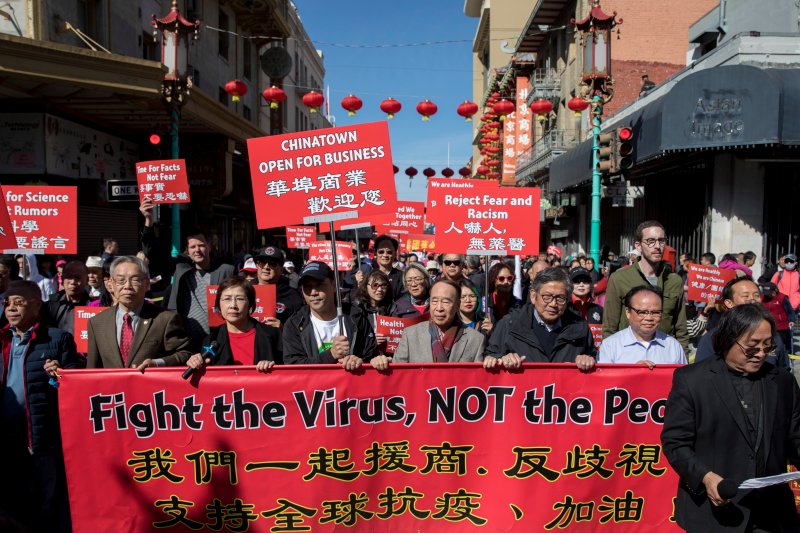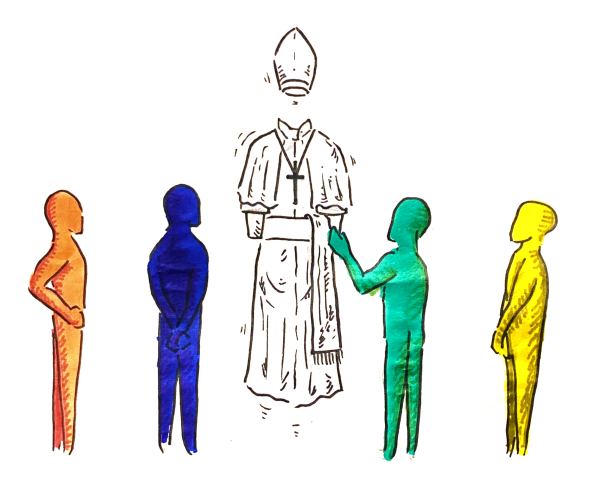We Are Not Your Model Minority
Chinatown residents along with local and state officials protest against racism against the Chinese community during a march in San Francisco on February 29.
Like many of you, I’ve been binging the newest Netflix original series Ginny and Georgia. The show, while light-hearted and humorous, touches on serious subjects. The Black biracial main character endures microaggressions and outright racist incidents in her predominantly white town. In one particularly shocking scene, Ginny exclaims to her Asian boyfriend during an argument, “You are closer to white than I’ll ever be.”
The perception that Asians have white proximity is dangerous. The fallacy that all Asian Americans have class privilege erases the violence and racism that Asians face on a daily basis.
In my Prep year, I remember a classmate arguing the night before the Asian American Footsteps Conference that Asians don’t experience racism because they are light-skinned. However, the grim reality of the Asian American experience has been exposed in the recent enormous surge in hate crimes in the United States. In January, an 84-year-old Thai man died after being assaulted on the street in San Francisco; in Oakland’s Chinatown, a 91-year-old man was shoved to the ground; in New York City, the Asian Hate Crime Task Force recorded 28 physical attacks in 2020, including a tragic assault where a man had his face slashed on the subway. Accomplished Korean-American actor John Cho wrote in an op-ed for the LA Times, “The pandemic is reminding us that our belonging is conditional. One moment we are Americans, the next we are all foreigners, who ‘brought’ the virus here.”
It’s troubling that it took these egregious events to show many people the precarious position of Asians in this country. According to The New York Times, many of the perpetrators of the recent incidents are Black, which contributes to the Asian community’s discomfort speaking out against these attacks, since doing so could further the criminalization of Black Americans.
In Ginny and Georgia, Ginny rants that Asians are “geniuses, talented, prodigies” – a stereotype she doesn’t apply to other people of color. She’s right, but this myth that Asians are the “model minority” harms all BIPOC in our efforts to build a more equitable society. The term model minority was normalized in the 1960s as a counterpoint to the “welfare queen” stereotype applied to African Americans and was used to drive a wedge between the Asian and the Black community and stymie the Civil Rights movement. Today, financially successful Asian Americans are still portrayed as proof for the veracity American dream, the promise of upward mobility, and the claim that the American system is equal and “race-blind,” even if 12.3% of Asian Americans live under the poverty line and have the most significant wealth disparity (between poor and rich Asian Americans) of any racial group.
Hate crimes against Asians are less frequent because of the seemingly complementary stereotypes forced upon us. However, the horrifying news we’ve seen recently exposes the dark underbelly of racism against Asians; our acceptance as Americans is conditional upon our continual validation of the American system as law-abiding, hard-working, and submissive people who don’t challenge the status quo. In his article, John Cho reminded us that “the most insidious effect” of the model minority myth is that “it seduces Asian Americans and recruits us to act on its behalf. It makes you feel protected, that you’re passing as one of the good ones.”
On top of the loss caused by COVID-19, the Asian community has had to deal with the misplaced anger of others who are suffering. It is easy to blame our current situation on one person who has inflamed hateful actions with deplorable rhetoric such as “Kung Flu” or “Chinese Virus,” but these atrocities are fueled by a history of systematic racism and silencing of Asian people. People are rarely taught about the history of people of Asian descent in America. Everyone needs to be better educated on the Chinese Exclusion Act, lynchings of Asian Americans, the internment of Japanese Americans during the Second World War, and many other instances of blatant discrimination and violence.
The type of “oppression Olympics” portrayed in Ginny and Georgia only divides people of color and further feeds systematic racism. If you want to be anti-racist, then stop minimizing hate against Asians. The model minority myth in no way works to our advantage or the advantage of other BIPOC. I’m tired of explaining why racism against Asians is real and wrong.






